
eNeuro
Scope & Guideline
Connecting minds to advance the science of the nervous system.
Introduction
Aims and Scopes
- Neural Mechanisms of Behavior:
Research exploring how various neural circuits and neurotransmitter systems influence behavior, including studies on decision-making, learning, and memory. - Neurodevelopment and Plasticity:
Investigations into how neural connections and brain structures develop and adapt over time, with a focus on plasticity in response to experience or injury. - Neuropharmacology and Therapeutics:
Studies examining the effects of pharmacological agents on neural function and behavior, aimed at identifying potential therapeutic targets for neurological disorders. - Advanced Imaging and Electrophysiological Techniques:
Utilization of cutting-edge imaging and electrophysiological methods to study brain activity and connectivity in real-time, enhancing our understanding of neural dynamics. - Neuroinflammation and Neurodegeneration:
Research into the roles of neuroinflammation and neurodegenerative processes in various diseases, with a focus on their cellular and molecular underpinnings. - Translational Neuroscience:
Work aimed at bridging basic neuroscience research with clinical applications, particularly in understanding and treating neurological and psychiatric disorders.
Trending and Emerging
- Neurotechnology and Computational Approaches:
An increasing number of studies are focusing on neurotechnologies, including advanced imaging, machine learning, and computational modeling, to analyze complex neural data and enhance experimental methodologies. - Interdisciplinary Research:
There is a growing trend towards interdisciplinary approaches that combine neuroscience with fields such as engineering, genetics, and computer science, fostering novel insights into brain function. - Neurodevelopmental Disorders:
Research into the underlying mechanisms of neurodevelopmental disorders, particularly autism and related conditions, is gaining momentum, with an emphasis on genetic, environmental, and neurobiological factors. - Neuroinflammation and Immune System Interactions:
Studies investigating the role of neuroinflammation and the immune system in neurological diseases are becoming more prevalent, reflecting a shift towards understanding brain health in the context of systemic processes. - Personalized and Precision Neuroscience:
Emerging research is increasingly focused on personalized approaches to treatment and understanding individual variability in neural responses, paving the way for tailored therapeutic strategies.
Declining or Waning
- Basic Behavioral Neuroscience Studies:
There has been a noticeable decline in purely behavioral studies without a strong molecular or neural basis, as the field increasingly emphasizes mechanistic insights. - Traditional Neuroanatomy:
Research focusing solely on classical neuroanatomical mapping without integrating functional or molecular data is becoming less common, as the field moves towards a more dynamic understanding of brain architecture. - Static Models of Neurodevelopment:
Research using static or simplistic models of neurodevelopment is declining in favor of more complex, dynamic models that account for environmental interactions and genetic factors. - Aging and Neurodegeneration as Isolated Topics:
While aging and neurodegeneration remain important, studies addressing these issues in isolation, without considering their interactions with other neurological processes, are less frequently published.
Similar Journals

Frontiers in Neuroscience
Pioneering discoveries in the realm of neuroscience.Frontiers in Neuroscience, published by FRONTIERS MEDIA SA, is a premier open-access journal dedicated to advancing our understanding of the nervous system through innovative and rigorous research. Since its inception in 2007, this journal has become an influential platform for researchers, featuring a diverse range of topics across various subfields of neuroscience. With its current ranking in the second quartile (Q2) of the category "Neuroscience (miscellaneous)" and a commendable position of #40 out of 113 in general neuroscience according to Scopus, Frontiers in Neuroscience is recognized for its high-impact contributions. The journal promotes free access to scholarly work, ensuring that cutting-edge neuroscience studies reach a global audience and foster collaboration across disciplines. By bridging gaps in knowledge and facilitating the exchange of ideas, Frontiers in Neuroscience plays a pivotal role in addressing the complexities of the nervous system and its effects on behavior, cognition, and health.

NEUROSCIENCE
Navigating the intricate landscape of the brain.NEUROSCIENCE, published by PERGAMON-ELSEVIER SCIENCE LTD, has established itself as a reputable journal in the field of neuroscience since its inception in 1976, continuing its contributions through 2024. With a Category Quartile ranking of Q2 in Neuroscience (miscellaneous) and a Scopus Rank of #41 out of 113, this journal represents a critical platform for the dissemination of innovative research and insights. Although it currently does not offer open access options, NEUROSCIENCE aims to advance our understanding of the nervous system by publishing high-quality original research, reviews, and methodological articles, thereby engaging a comprehensive audience of researchers, professionals, and students alike. With an impact factor that reflects its significance in the scientific community, this journal remains a go-to source for cutting-edge discoveries and scholarly discussions in the dynamic field of neuroscience.

Annual Review of Neuroscience
Elevating Understanding Through Authoritative ReviewsThe Annual Review of Neuroscience, published by Annual Reviews, is a premier journal that has been at the forefront of neuroscience research since its inception in 1978. With an ISSN of 0147-006X and E-ISSN 1545-4126, this leading academic journal boasts a remarkable impact factor, placing it in the prestigious Q1 category in Neuroscience (miscellaneous), with an impressive Scopus ranking of 4 out of 113 and a stellar 96th percentile in general neuroscience. Focused on publishing comprehensive and authoritative review articles, the Annual Review of Neuroscience aims to synthesize and critically evaluate the latest advances in the field, making it an indispensable resource for researchers, professionals, and students alike. While it does not offer open access, the insights and discoveries highlighted in its issues are crucial for those dedicated to understanding the complexities of the nervous system and driving forward innovative research. With a commitment to excellence and a forward-looking perspective, this journal continues to shape and influence the future of neuroscience.

PROGRESS IN NEUROBIOLOGY
Advancing the Frontiers of NeurosciencePROGRESS IN NEUROBIOLOGY is a prestigious journal dedicated to advancing the field of neuroscience, published by Pergamon-Elsevier Science Ltd. With an impressive impact factor, it stands as a critical resource for researchers, professionals, and students alike, featuring rigorous peer-reviewed articles that explore the latest developments in neurobiology. The journal has established itself as a leading publication, ranked in the Q1 category for Neuroscience (miscellaneous) and holding a notable 13/113 rank in General Neuroscience per Scopus metrics, placing it in the top 12% of its field. Since its inception in 1959, PROGRESS IN NEUROBIOLOGY has covered a wide array of topics, from molecular mechanisms to cognitive processes, fostering a comprehensive understanding of brain functions. While the journal is not open access, it ensures accessibility to profound knowledge through institutional subscriptions. Researchers and scholars will find critical analyses and innovative research that are pivotal for both foundational knowledge and cutting-edge investigations in the neuroscience realm.

Frontiers in Cellular Neuroscience
Pioneering open-access research in cellular neuroscience.Frontiers in Cellular Neuroscience, published by FRONTIERS MEDIA SA, is an esteemed open-access journal operating out of Switzerland that has been at the forefront of disseminating cutting-edge research since its inception in 2007. With a focus on the cellular and molecular aspects of neuroscience, this journal addresses fundamental questions and advances our understanding of the nervous system, making it indispensable for researchers, professionals, and students in the field. As of 2023, it is ranked in the Q2 category for Cellular and Molecular Neuroscience, positioned at rank #27 out of 97 in Scopus, and boasting a notable 72nd percentile ranking, reflecting its impactful contributions to the discipline. The journal's commitment to open access enhances the accessibility of vital research findings, promoting knowledge sharing and collaboration. Researchers looking for a platform to publish groundbreaking neuroscience research will find Frontiers in Cellular Neuroscience an ideal venue for reaching a wide audience.

CORTEX
Exploring the Frontiers of Cognitive NeuroscienceCORTEX is a premier international journal published by Elsevier Masson, focusing on the cutting-edge areas of cognitive neuroscience, psychology, and neurology. With an impressive impact factor that places it in Q1 quartiles across multiple categories such as Cognitive Neuroscience and Neuropsychology, this journal serves as a vital resource for researchers, clinicians, and students alike. Established in 1964, CORTEX has continued to excel in disseminating high-quality scholarly work, offering insights that significantly enhance our understanding of the brain's functioning and behavior. Although not an open-access publication, it provides various access options to ensure the dissemination of knowledge is as wide-reaching as possible. As the field of cognitive psychology evolves, CORTEX remains at the forefront, fostering an environment for interdisciplinary collaboration and innovation. Researchers seeking to stay engaged with the latest advancements will find CORTEX an indispensable tool for their professional development.

ASN Neuro
Championing High-Impact Research in Neurology and NeuroscienceASN Neuro is an esteemed academic journal published by Frontiers Media SA, focusing on critical advancements in the fields of neurology and neuroscience. Since its inception in 2009, it has established itself as an Open Access platform dedicated to fostering the dissemination of knowledge and research findings that address the complexities of the nervous system. With an impressive impact factor and consistently ranking in the top quartiles of its categories—Q1 in Neurology (clinical) and Q2 in Neuroscience (miscellaneous)—ASN Neuro is recognized for its high-quality publications that cater to the evolving challenges in clinical neurology and general neuroscience. Currently, it ranks 68th out of 400 journals in Clinical Neurology and 28th out of 113 in General Neuroscience, affirming its reputable position within the academic community. Researchers, professionals, and students alike are encouraged to contribute to and benefit from this impactful journal as it presents a unique opportunity to engage with cutting-edge research, innovative methodologies, and insightful reviews in the ever-evolving landscape of brain science.

Brain and Behavior
Fostering Interdisciplinary Research in Behavioral Science.Brain and Behavior is a premier open-access journal published by WILEY, dedicated to advancing the field of Behavioral Neuroscience. With its ISSN 2162-3279, the journal has established itself as a vital resource for researchers, professionals, and students alike, fostering the dissemination of cutting-edge research since its inception in 2011. Renowned for its rigorous peer-review process, it enjoys a commendable Q2 ranking within the field, reflecting its impactful contributions and relevance in the scientific community. The journal not only emphasizes innovative studies that bridge behavioral science and neuroscience but also serves as a platform for diverse methodologies and interdisciplinary approaches. Accessible [open access](https://onlinelibrary.wiley.com/journal/21623279), Brain and Behavior invites submissions that explore the neural mechanisms underlying behavior, aiming to engage a global audience eager to expand the boundaries of knowledge in this dynamic field. Positioned in the heart of the United States, at 111 River St, Hoboken, NJ, it is strategically placed to collaborate with leading institutions and researchers worldwide.

NEUROSCIENTIST
Advancing the Frontiers of Neurological ScienceNEUROSCIENTIST is a leading journal in the field of clinical neurology and neuroscience, published by SAGE Publications Inc. With an impressive impact factor reflected in its Q1 quartile ranking in both clinical neurology and miscellaneous neuroscience as of 2023, this journal positions itself as a crucial platform for the latest research and advancements in the neural sciences. Spanning from 1995 to 2024, NEUROSCIENTIST features a range of high-quality, peer-reviewed articles that cater to researchers, practitioners, and students alike. Although it does not offer Open Access options, the journal remains a vital resource owing to its Scopus rankings, situating it within the top percentile of its categories: ranked #28 out of 400 in clinical neurology and #15 out of 113 in general neuroscience. The journal's commitment to disseminating significant findings underlines its importance in fostering advancements in neurological understanding and treatment.

BRAIN RESEARCH
Pioneering insights into brain function and disorders.BRAIN RESEARCH is a premier journal published by Elsevier, specializing in the intricate domains of neuroscience, developmental biology, and molecular biology. Established in 1966, this esteemed publication has become a cornerstone for researchers, professionals, and students dedicated to advancing our understanding of brain function and disorders. With an impressive impact factor and a consistent presence in the Q2 quartiles across key categories—such as Developmental Biology, Neurology, and Neuroscience—it stands out as an essential resource for disseminating innovative research and pioneering insights. The journal's scope encompasses both clinical and fundamental studies, fostering a multidisciplinary approach to the complexities of neural systems. Although it is not an open-access journal, BRAIN RESEARCH provides a vital platform for sharing progressive findings that can inspire future studies and contribute significantly to the evolutionary discourse in neuroscience. Based in the Netherlands, at RADARWEG 29, 1043 NX AMSTERDAM, BRAIN RESEARCH continues to shape the landscape of neuroscience research, inviting submissions that explore the latest discoveries and therapeutic strategies.